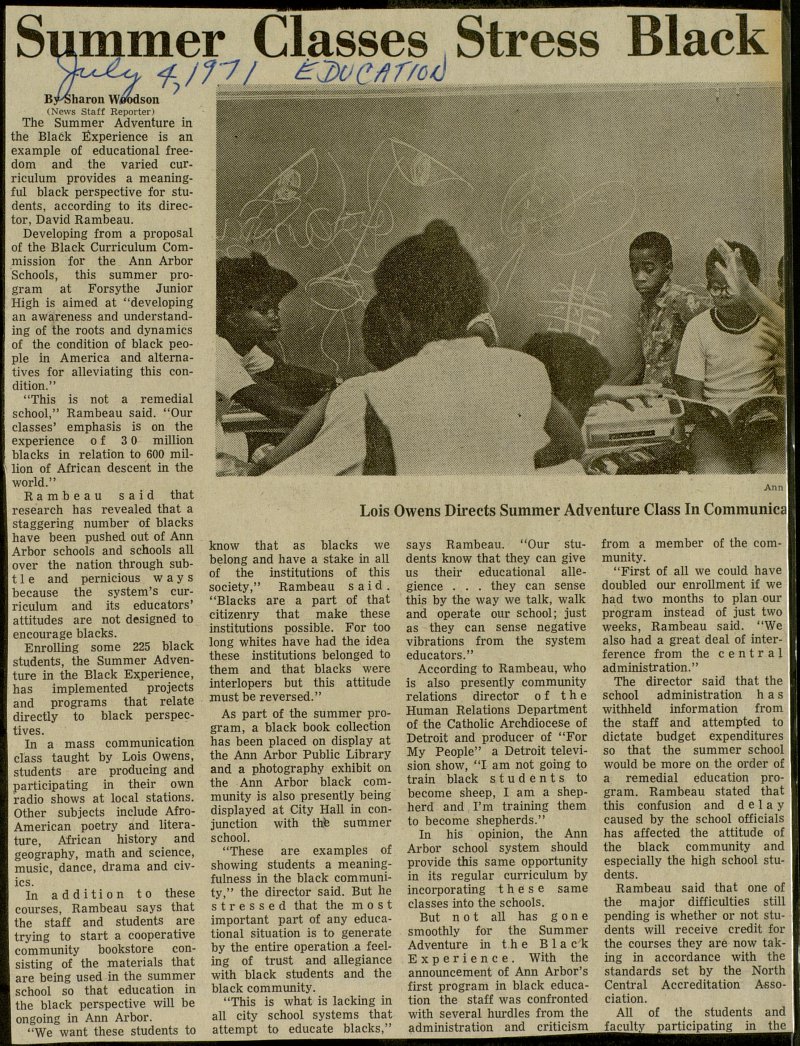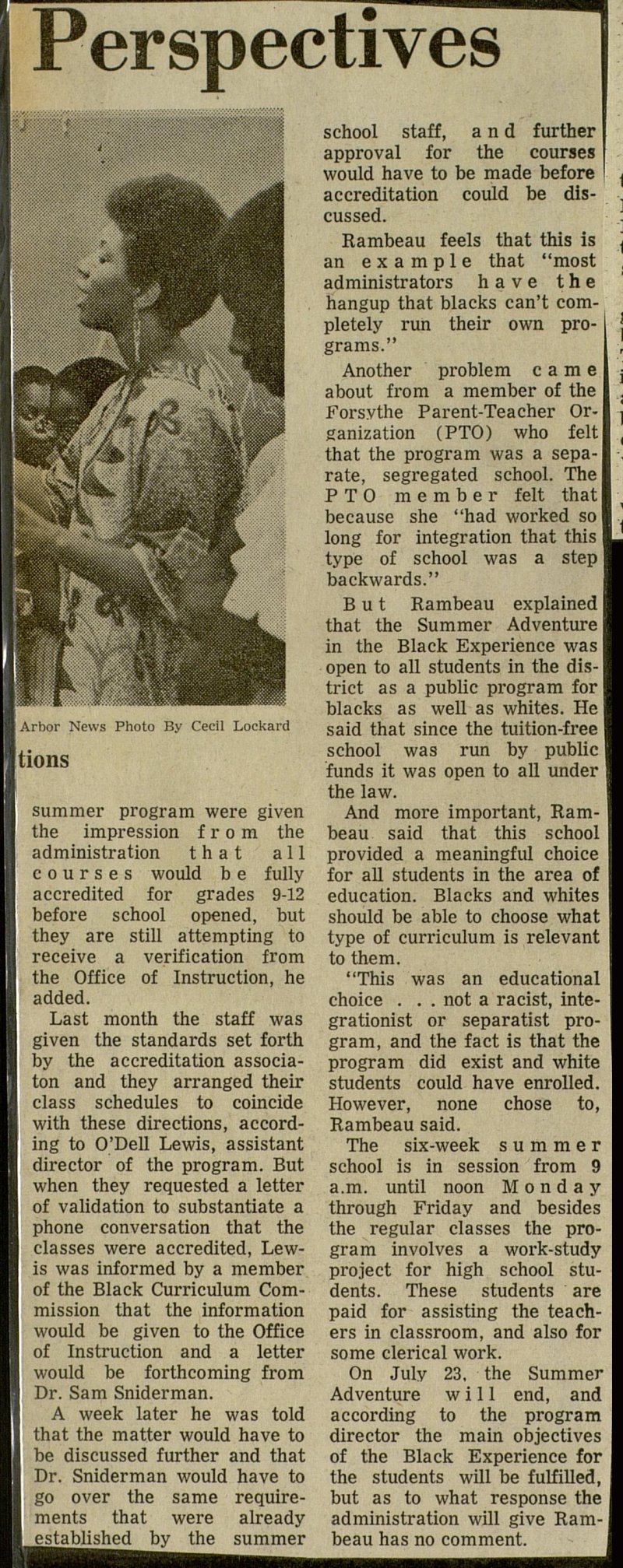Summer Classes Stress Black


The Summer Adventure in the Black Experience is an example of educational freedom and the varied curriculum provides a meaningful black perspective for students, according to its director, David Rambeau. Developing from a proposal of the Black Curriculum Commission for the Ann Arbor Schools, this summer program at Forsythe Junior High is aimed at "developing an awareness and understanding of the roots and dynamics of the condition of black people in America and alternatives for alleviating this condition." "This is not a remedial school," Rambeau said. "Our classes' emphasis is on the experience of 30 million blacks in relation to 600 million of African descent in the world." Rambeau said that research has revealed that a staggering number of blacks have been pushed out of Ann Arbor schools and schools all over the nation through subtle and pernicious ways because the system's curriculum and its educators' attitudes are not designed to encourage blacks. Enrolling some 225 black students, the Summer Adventure in the Black Experience, has implemented projects and programs that relate directly to black perspectives. In a mass communication class taught by Lois Owens, students are producing and participating in their own radio shows at local stations. Other subjects include Afro-American poetry and literature, African history and geography, math and science, music, dance, drama and civics. In addition to these courses, Rambeau says that the staff and students are trying to start a cooperative community bookstore consisting of the materials that are being used in the summer school so that education in the black perspective will be ongoing in Ann Arbor. "We want these students to know that as blacks we belong and have a stake in all of the institutions of this society," Rambeau said. "Blacks are a part of that citizenry that make these institutions possible. For too long whites have had the idea these institutions belonged to them and that blacks were interlopers but this attitude must be reversed." As part of the summer program, a black book collection has been placed on display at the Ann Arbor Public Library and a photography exhibit on the Ann Arbor black community is also presently being displayed at City Hall in conjunction with the summer school. "These are examples of showing students a meaningfulness in the black community," the director said. But he stressed that the most important part of any educational situation is to generate by the entire operation a feeling of trust and allegiance with black students and the black community. "This is what is lacking in all city school systems that attempt to educate blacks," says Rambeau. "Our students know that they can give us their educational allegiance . . . they can sense this by the way we talk, walk and operate our school; just as they can sense negative vibrations from the system educators." According to Rambeau, who is also presently community relations director of the Human Relations Department of the Catholic Archdiocese of Detroit and producer of "For My People" a Detroit television show, "I am not going to train black students to become sheep, I am a shepherd and I'm training them to become shepherds." ín his opinion, the Ann Arbor school system should provide this same opportunity in its regular curriculum by incorporating these same classes into the schools. But not all has gone smoothly for the Summer Adventure in the Black Experience. With the announcement of Ann Arbor's first program in black education the staff was confronted with several hurdles from the administration and criticism from a member of the community. "First of all we could have I doubled our enrollment if we I had two months to plan our I program instead of just two I weeks, Rambeau said. "We I also had a great deal of interference from the central! administration." The director said that the I school administration has withheld information from the staff and attempted to dictate budget expenditures so that the summer school would be more on the order of a remedial education program. Rambeau stated that this confusion and d e 1 a y caused by the school officials has affected the attitude of the black community and especially the high school students. Rambeau said that one of the major difficulties still pending is whether or not students will receive credit for the courses they are now taking in accordance with the standards set by the North Central Accreditation Association. All of the students and faculty participating in the summer program were given the impression f r o m the administration t h a t all courses would b e fully accredited for grades 9-12 before school opened, but they are still attempting to receive a verification from the Office of Instruction, he added. Last month the staff was given the standards set forth by the accreditation association and they arranged their class schedules to coincide with these directions, according to O'Dell Lewis, assistant director of the program. But when they requested a letter of validation to substantiate a phone conversation that the classes were accredited, Lewis was informed by a member of the Black Curriculum Commission that the information would be given to the Office of Instruction and a letter would be forthcoming from Dr. Sam Sniderman. A week later he was told that the matter would have to be discussed further and that Dr. Sniderman would have to go over the same requirements that were already established by the summer school staff, and further approval for the courses would have to be made before accreditation could be discussed. Rambeau feels that this is an example that "most administrators have the hangup that blacks can't completely run their own programs." Another problem came about from a member of the Forsythe Parent-Teacher Organization (PTO) who felt that the program was a separate, segregated school. The PTO member felt that because she "had worked so long for integration that this type of school was a step I backwards." B u t Rambeau explained I that the Summer Adventure I in the Black Experience was I open to all students in the 1 trict as a public program for I blacks as well as whites. Hel said that since the tuition-free I school was run by public funds it was open to all under the law. And more important, Rambeau said that this school provided a meaningful choice for all students in the area of education. Blacks and whites should be able to choose what type of curriculum is relevant to them. "This was an educational choice . . . not a racist, integrationist or separatist program, and the fact is that the I program did exist and white students could have enrolled. However, none chose to, Rambeau said. The six-week summer school is in session from 9 a.m. until noon Monday through Friday and besides the regular classes the program involves a work-study project for high school students. These students are paid for assisting the teachers in classroom, and also for some clerical work. On July 23, the Summer Adventure w i 1 1 end, and according to the program director the main objectives of the Black Experience for the students will be fulfilled, but as to what response the administration will give Rambeau has no comment.